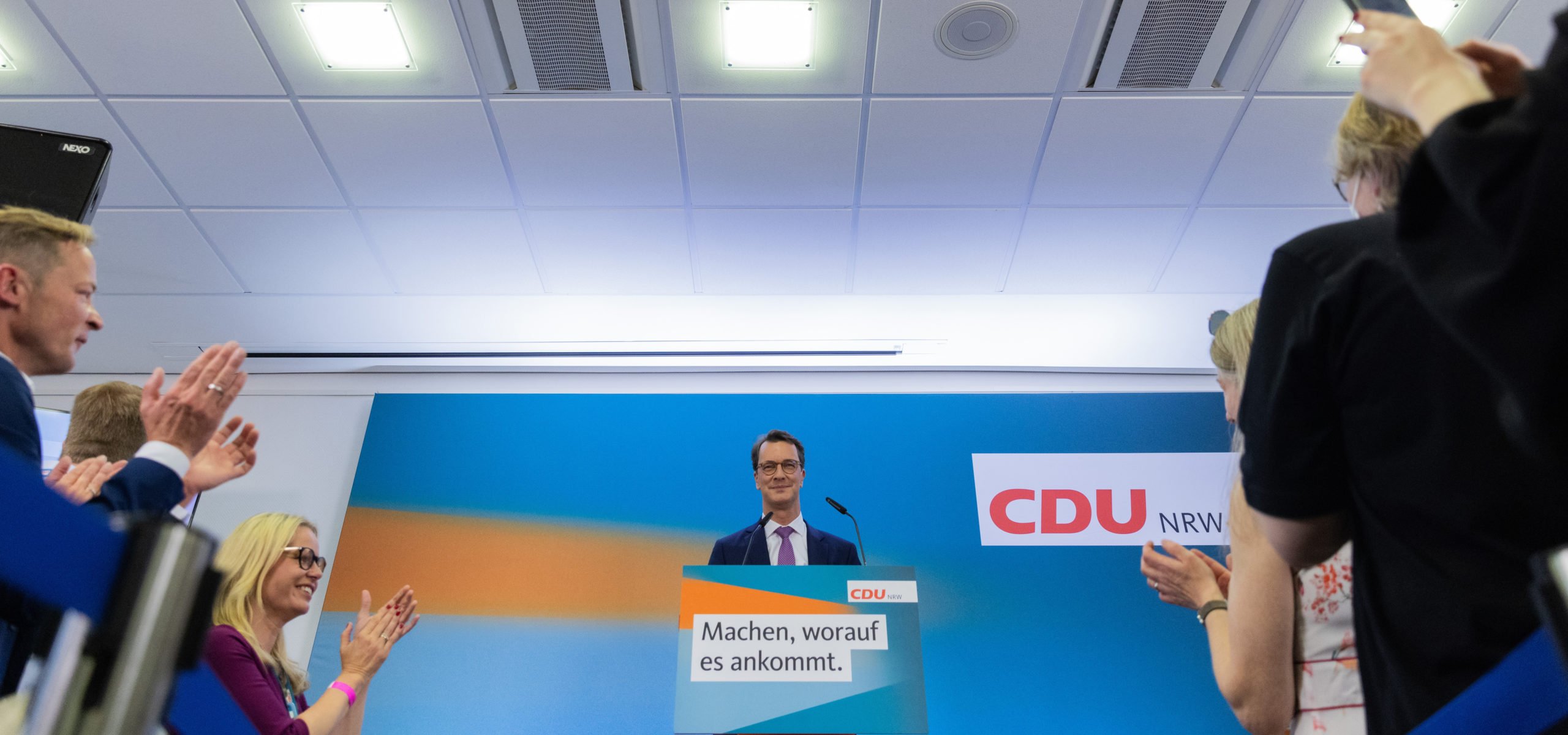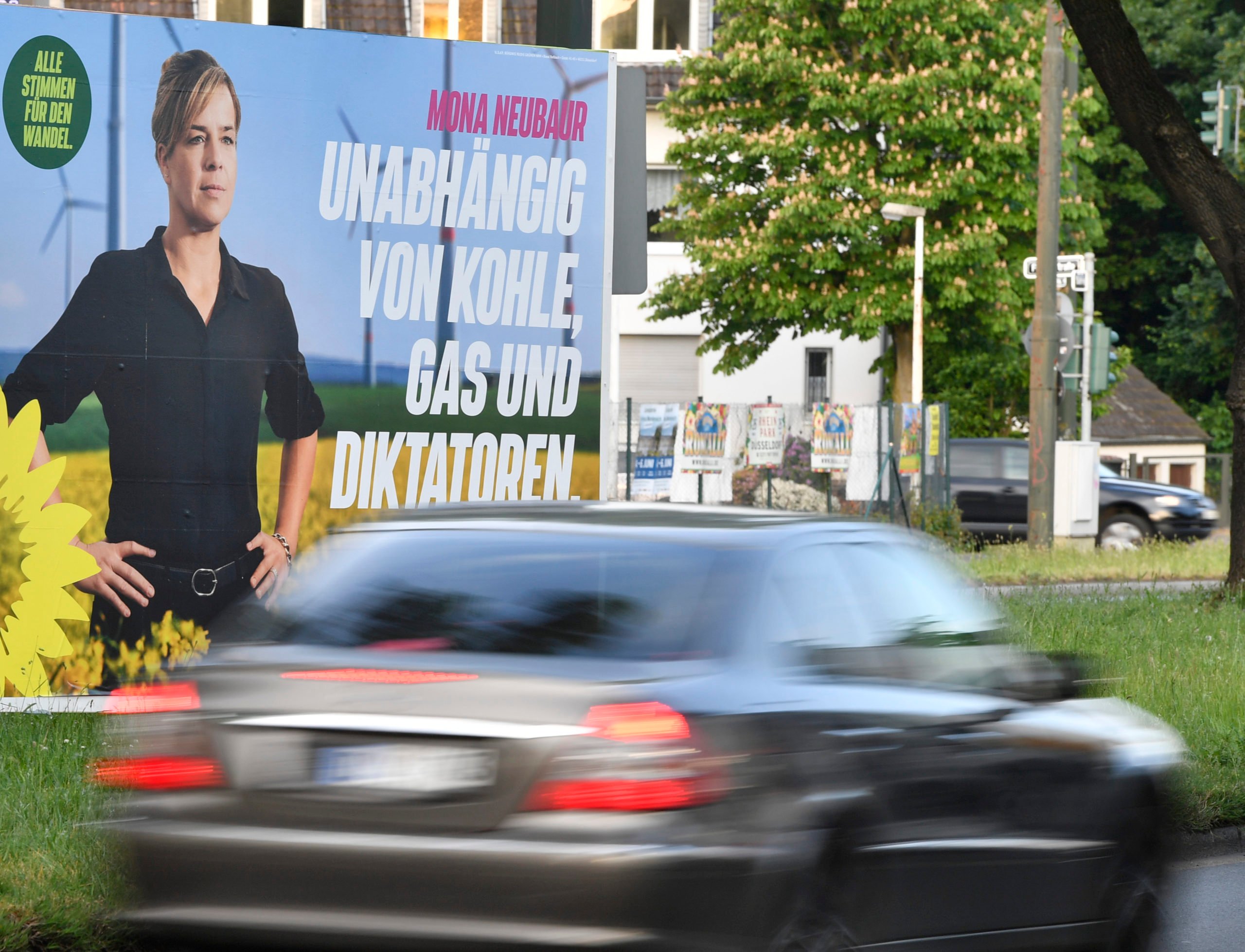Why the Greens are the real winners of Germany's state elections

German state elections don't tell us everything about the public mood, but the past few votes have revealed some pretty clear winners and losers. While support for the SPD is flagging, the Greens are growing in stature by the day, writes Brian Melican.
It’s one of the peculiarities of Germany’s federal system that we’re almost never more than six months away from an election being held somewhere. Alongside the national elections (Bundestagswahl) usually every four years, each of the 16 states also hold ballots (Landtagswahl) on varying cycles; then there are local and mayoral elections, too. As such, rolling campaigning and more-or-less continuous election analysis are a part of life here: “What does Election X say about Government Y?” is a question you will always hear being asked somewhere.
Nevertheless, regional elections have a habit of clustering – and generally come at points when national governments would rather not have people poring over electoral data. And this year, after barely six months in office, Olaf Scholz’ novel tri-partite traffic-light coalition has already been faced with three regional elections – in Saarland (27th March), last week in Schleswig-Holstein (8th May), and yesterday in North-Rhine Westphalia (15th May). On a regional level, the popularity of the Social Democrats (SPD), Greens and Free Democrats (FDP) has already been thoroughly tested.
Understanding state elections
The key thing to remember about German regional elections are that they both are and aren’t about national politics. Firstly, here’s how they aren't. At a basic level, these regional elections are simply about voters choosing a government to deal with state-level remits (mainly health, education, and housing). They will vote first and foremost on these issues.
Personality politics are also important: long-serving German state premiers frequently garner the unofficial honorific Landesvater or Landesmutter – literally: ‘father/mother of the state’ – and benefit from high personal approval ratings, allowing them to withstand changes in mood at national level. So it is by no means infrequent for voters to return completely different parties in regional than at national elections. By way of example, while Olaf Scholz, SPD, remained a popular Landesvater figure in Hamburg, Merkel’s CDU still won more Hamburg votes at national elections.
READ ALSO: EXPLAINED: Why Sunday’s state parliament vote in NRW is important for German politics
Then again, regional elections also are about national politics. That’s because they never take place in a vacuum (except for in Bavaria, of course, where everyone always votes CSU). Even the most beloved of state premiers faces an uphill struggle if their party is currently making a hash of things in Berlin. What is more, the larger and the more representative the Bundesland, the more results of its elections can show swings in voter mood which may be of national relevance.
The Greens’ slow ascent from their mid-2000s funk to their current swagger began in Baden-Württemberg: winning control of this state populated by 11 million people and many of Germany’s top industrialists showed that voters trusted them to be part of a government. That set the ball rolling and by the time of last year’s national election, the Greens were already in power in half of federal states. Incidentally, it is often overlooked that state governments make up the Bundesrat, the second chamber of parliament, which can accept or refuse laws made by the Bundestag. So shifts in power here can be of national relevance.
This dichotomy has the predictable effect that, in the aftermath of every Landtagswahl, the losing parties usually claim that it was simply a regional ballot with nothing to say about national politics while the winning parties play up the significance at federal level.

Chancellor Olaf Scholz (SPD) congratulates Thomas Kutschaty, SPD candidate in North Rhine-Westphalia, after the party wins 26.7 percent of the vote. Photo: picture alliance/dpa | Kay Nietfeld
An SPD disaster
This is why it is very bad news for Olaf Scholz and the SPD that their only victory in spring 2022’s three Landtagswahlen was in dinky little Saarland, a state whose population is smaller than that of a major city like Cologne and whose local politics are so marked by rivalries and infighting as to have little-to-no relevance nationally. Despite winning an absolute majority in the regional parliament at Saarbrücken (a rare feat in proportional representation), there was no way the SPD could claim a national bearing – and, to its credit, didn’t try to do so either.
In Schleswig-Holstein, the SPD wasn’t expected to unseat the CDU’s Daniel Günther, a likeable and well-liked premier coming to the end of five years at the helm of a surprisingly successful Jamaica coalition with the Greens and the FDP. Here, too, the national relevance was relatively low: Schleswig-Holstein has only 3 million inhabitants and few large towns and cities. Nevertheless, losing over half its seats while the Greens and CDU gained by the same amount was not a good result for the SPD.
What was disastrous, however, was last night’s result in North-Rhine Westphalia. With a population the size of the neighbouring Netherlands (17 million) and everything from Germany’s largest urban conurbation down to isolated mountain regions, NRW is often considered a microcosm of the country as a whole. As something of a swing state, parties which succeed here often go on to win the next national election (if they aren’t already in government).
READ ALSO:
- Heavy defeat for Scholz’s SPD in German regional vote
- Four things the Schleswig-Holstein vote tells us about German politics
What is more, unlike in Schleswig-Holstein, NRW was the SDP’s to win. Until last year, its premier was the luckless Armin Laschet (remember him?), who plumbed popularity depths in his failed bid to become Chancellor. He then left a badly-damaged CDU-FDP administration to Hendrik Wüst, a successor whose profile, if he had one at all, was defined by various low-level corruption scandals (including a regrettable incident where he sold slots with the then-NRW premier, Jürgen Rüttgers, to high-paying commercial lobbyists…).

Re-elected NRW state premier Hendrik Wüst (CDU) celebrates his victory. Photo: picture alliance/dpa | Rolf Vennenbernd
Even if Wüst proved to be an unexpectedly good campaigner and the SPD’s Thomas Kutschaty remained oddly faceless, the fact that Olaf Scholz himself got involved and that the SPD still ended up with its worst showing in NRW ever is nothing less than a serious defeat for both the Chancellor and his party – one which, in my view, underlines how Scholz has not yet lived up to expectations.
Nevertheless, he is in luck. Firstly, the electoral cycle means that this upset is occurring at the beginning of his term; there will be time to recover. Secondly, although Wüst gets first crack at forming a government, the Greens are his only real potential partner – and will take a lot of courting. NRW Greens are on the more left-wing end of the spectrum and will play the field, potentially trying to usher in a mini traffic-light coalition in Düsseldorf if it looks feasible later.
READ ALSO: OPINION: Scholz is already out of step with Germany – it’s time for a change of course
Growing support for Greens
So after the post-Merkel rout, the CDU has scored an important and much-needed victory, but harnessing it to get momentum nationally may yet prove difficult. Indeed, it’s the Greens who have come out of the last two weekends with a new swing in their step. Following a disappointing national election last year, they have once again hit their stride, due in no small part to the Ukraine reminding voters of why renewable energy is important on the one hand and the impressive figures cut by Robert Habeck and Annalena Baerbock in government on the other.
For the FDP, things are not looking so good. Despite negotiating a disproportionately high amount of their manifesto into last year’s agreement, they are suffering the fate of many a junior coalition partner: a lack of profile. On strictly regional terms, they lost votes to the popular Daniel Günther in Schleswig-Holstein (perhaps unavoidably, despite a good record as part of his coalition) and to the not-yet-popular Hendrik Wüst (following lacklustre performance in government in Düsseldorf).

Posters featuring Greens candidate Mona Neubaur highlight the link between fossil fuels and Russia's authoritarian leadership. Photo: picture alliance/dpa | Roberto Pfeil
Worryingly for Christian Lindner, however, this may be harbinger of history repeating itself. Essentially, FDP voters tend to get enthusiastic for a business-friendly go-getter type who promises to lower taxes and slash regulation, only to later turn their back on him when, once part of a coalition government, he proves unable to deliver the small-state free-for-all promised. That’s what happened to Guido Westerwelle in the 2009-2013 administration, in any case.
There is, however, one bit of unadulterated good news for all parties and indeed our country as a whole: the AfD lost vote share everywhere. The populist outfit didn’t even make it into parliament in Schleswig-Holstein and only just scraped in in NRW. It would seem that, in times of crisis, voters don’t want to add to the list of potential disasters by putting populists anywhere near power. This is a hypothesis we’ll be able to test in just under six months’ time, by the way, when Lower-Saxony goes to the polls on 9th October.
Comments (1)
See Also
It’s one of the peculiarities of Germany’s federal system that we’re almost never more than six months away from an election being held somewhere. Alongside the national elections (Bundestagswahl) usually every four years, each of the 16 states also hold ballots (Landtagswahl) on varying cycles; then there are local and mayoral elections, too. As such, rolling campaigning and more-or-less continuous election analysis are a part of life here: “What does Election X say about Government Y?” is a question you will always hear being asked somewhere.
Nevertheless, regional elections have a habit of clustering – and generally come at points when national governments would rather not have people poring over electoral data. And this year, after barely six months in office, Olaf Scholz’ novel tri-partite traffic-light coalition has already been faced with three regional elections – in Saarland (27th March), last week in Schleswig-Holstein (8th May), and yesterday in North-Rhine Westphalia (15th May). On a regional level, the popularity of the Social Democrats (SPD), Greens and Free Democrats (FDP) has already been thoroughly tested.
Understanding state elections
The key thing to remember about German regional elections are that they both are and aren’t about national politics. Firstly, here’s how they aren't. At a basic level, these regional elections are simply about voters choosing a government to deal with state-level remits (mainly health, education, and housing). They will vote first and foremost on these issues.
Personality politics are also important: long-serving German state premiers frequently garner the unofficial honorific Landesvater or Landesmutter – literally: ‘father/mother of the state’ – and benefit from high personal approval ratings, allowing them to withstand changes in mood at national level. So it is by no means infrequent for voters to return completely different parties in regional than at national elections. By way of example, while Olaf Scholz, SPD, remained a popular Landesvater figure in Hamburg, Merkel’s CDU still won more Hamburg votes at national elections.
READ ALSO: EXPLAINED: Why Sunday’s state parliament vote in NRW is important for German politics
Then again, regional elections also are about national politics. That’s because they never take place in a vacuum (except for in Bavaria, of course, where everyone always votes CSU). Even the most beloved of state premiers faces an uphill struggle if their party is currently making a hash of things in Berlin. What is more, the larger and the more representative the Bundesland, the more results of its elections can show swings in voter mood which may be of national relevance.
The Greens’ slow ascent from their mid-2000s funk to their current swagger began in Baden-Württemberg: winning control of this state populated by 11 million people and many of Germany’s top industrialists showed that voters trusted them to be part of a government. That set the ball rolling and by the time of last year’s national election, the Greens were already in power in half of federal states. Incidentally, it is often overlooked that state governments make up the Bundesrat, the second chamber of parliament, which can accept or refuse laws made by the Bundestag. So shifts in power here can be of national relevance.
This dichotomy has the predictable effect that, in the aftermath of every Landtagswahl, the losing parties usually claim that it was simply a regional ballot with nothing to say about national politics while the winning parties play up the significance at federal level.

An SPD disaster
This is why it is very bad news for Olaf Scholz and the SPD that their only victory in spring 2022’s three Landtagswahlen was in dinky little Saarland, a state whose population is smaller than that of a major city like Cologne and whose local politics are so marked by rivalries and infighting as to have little-to-no relevance nationally. Despite winning an absolute majority in the regional parliament at Saarbrücken (a rare feat in proportional representation), there was no way the SPD could claim a national bearing – and, to its credit, didn’t try to do so either.
In Schleswig-Holstein, the SPD wasn’t expected to unseat the CDU’s Daniel Günther, a likeable and well-liked premier coming to the end of five years at the helm of a surprisingly successful Jamaica coalition with the Greens and the FDP. Here, too, the national relevance was relatively low: Schleswig-Holstein has only 3 million inhabitants and few large towns and cities. Nevertheless, losing over half its seats while the Greens and CDU gained by the same amount was not a good result for the SPD.
What was disastrous, however, was last night’s result in North-Rhine Westphalia. With a population the size of the neighbouring Netherlands (17 million) and everything from Germany’s largest urban conurbation down to isolated mountain regions, NRW is often considered a microcosm of the country as a whole. As something of a swing state, parties which succeed here often go on to win the next national election (if they aren’t already in government).
READ ALSO:
- Heavy defeat for Scholz’s SPD in German regional vote
- Four things the Schleswig-Holstein vote tells us about German politics
What is more, unlike in Schleswig-Holstein, NRW was the SDP’s to win. Until last year, its premier was the luckless Armin Laschet (remember him?), who plumbed popularity depths in his failed bid to become Chancellor. He then left a badly-damaged CDU-FDP administration to Hendrik Wüst, a successor whose profile, if he had one at all, was defined by various low-level corruption scandals (including a regrettable incident where he sold slots with the then-NRW premier, Jürgen Rüttgers, to high-paying commercial lobbyists…).

Even if Wüst proved to be an unexpectedly good campaigner and the SPD’s Thomas Kutschaty remained oddly faceless, the fact that Olaf Scholz himself got involved and that the SPD still ended up with its worst showing in NRW ever is nothing less than a serious defeat for both the Chancellor and his party – one which, in my view, underlines how Scholz has not yet lived up to expectations.
Nevertheless, he is in luck. Firstly, the electoral cycle means that this upset is occurring at the beginning of his term; there will be time to recover. Secondly, although Wüst gets first crack at forming a government, the Greens are his only real potential partner – and will take a lot of courting. NRW Greens are on the more left-wing end of the spectrum and will play the field, potentially trying to usher in a mini traffic-light coalition in Düsseldorf if it looks feasible later.
READ ALSO: OPINION: Scholz is already out of step with Germany – it’s time for a change of course
Growing support for Greens
So after the post-Merkel rout, the CDU has scored an important and much-needed victory, but harnessing it to get momentum nationally may yet prove difficult. Indeed, it’s the Greens who have come out of the last two weekends with a new swing in their step. Following a disappointing national election last year, they have once again hit their stride, due in no small part to the Ukraine reminding voters of why renewable energy is important on the one hand and the impressive figures cut by Robert Habeck and Annalena Baerbock in government on the other.
For the FDP, things are not looking so good. Despite negotiating a disproportionately high amount of their manifesto into last year’s agreement, they are suffering the fate of many a junior coalition partner: a lack of profile. On strictly regional terms, they lost votes to the popular Daniel Günther in Schleswig-Holstein (perhaps unavoidably, despite a good record as part of his coalition) and to the not-yet-popular Hendrik Wüst (following lacklustre performance in government in Düsseldorf).

Worryingly for Christian Lindner, however, this may be harbinger of history repeating itself. Essentially, FDP voters tend to get enthusiastic for a business-friendly go-getter type who promises to lower taxes and slash regulation, only to later turn their back on him when, once part of a coalition government, he proves unable to deliver the small-state free-for-all promised. That’s what happened to Guido Westerwelle in the 2009-2013 administration, in any case.
There is, however, one bit of unadulterated good news for all parties and indeed our country as a whole: the AfD lost vote share everywhere. The populist outfit didn’t even make it into parliament in Schleswig-Holstein and only just scraped in in NRW. It would seem that, in times of crisis, voters don’t want to add to the list of potential disasters by putting populists anywhere near power. This is a hypothesis we’ll be able to test in just under six months’ time, by the way, when Lower-Saxony goes to the polls on 9th October.
Join the conversation in our comments section below. Share your own views and experience and if you have a question or suggestion for our journalists then email us at [email protected].
Please keep comments civil, constructive and on topic – and make sure to read our terms of use before getting involved.
Please log in here to leave a comment.